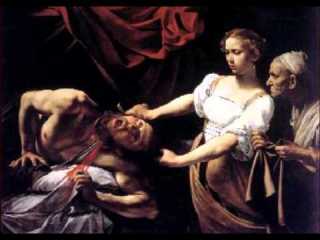Antonio Vivaldi - Juditha Triumphans (Marcon) [2009]
Antonio Vivaldi - Juditha Triumphans (Marcon) [2009]

1. Part I 2. Part II Vagaus - Karina Gauvin, sopran Juditha - Manuela Custer, mezzosopran Holofernes - Mary-Ellen Nesi, mezzosopran Abra - Marina Comparato, mezzosopran Ozias - Romina Basso, mezzosopran Nationaal Jeugdkoor Venice Baroque Orchestra Andrea Marcon - conductor ZaterdagMatinee, Concertgebouw Amsterdam 30 May 2009
Juditha triumphans devicta Holofernes barbarie, oratorio in 2 parts, RV 644.
With a Latin text by Giacomo Casetti, this oratorio was written for women soloists. Some of the arias survived with only figured bass rather than full orchestration; some performers accompany these arias only with keyboard continuo, while others orchestrate in Vivaldi's style, which in this case includes fairly lavish use of woodwinds, brass, and tympani (in the opening chorus, where soldiers sing of "arms, slaughter, revenge, fury," and in the end).
The action moves quickly, even operatically, despite being propelled by a series of repetitive da capo arias. It opens in the camp of General Holofernes, as his soldiers (in the aforementioned chorus) prepare to slaughter their Hebrew enemies. Holofernes delivers a rousing address to his soldiers in the form of a recitative and florid da capo aria, culminating in the admonition "Nil arma, nil bella" (Arms are naught, wars are naught...if the soldier's heart be not firm).
There follows a little exchange between Holofernes and his servant Vagans, who brings news that an extremely beautiful woman from the enemy camp would like to see the commander. The conversation is in recit form, while Vagans' aria ("Matrona inimica") is fairly quiet and tender, though lavishly ornamented. The woman, a widow named Judith, is brought in, and in a stately aria ("Quocum patriae me ducit amore") she invokes heavenly aid in the success of her plan; she is encouraged by her handmaid, Abra, who tells her in another aria not to fear to rejoice, for her virtue will have its reward.
There follows an appreciative section for Vagans and the soldiers' chorus in praise of Judith's beauty, then an exchange between Judith and the smitten Holofernes in recitative, culminating in Judith's aria beseeching Holofernes to grant her people peace. The general sings an aria praising her beauty and invites her to a banquet. Judith replies with an agitated, colorful aria likening herself to a sparrow tossed by a treacherous wind.
The work continues in this vein. In Part 2, Holofernes drinks heavily, toasting to love and promising peace. Eventually he passes out; left alone, Judith draws his sword and decapitates him. (She does this during a dramatic narrative recitative, following a stern preparatory aria, "In somno profundo.") She escapes the camp with the general's head. Vagans calls for vengeance, but back home in Bethulia, the high priest Ozias (in a celebratory aria) and his people (in a brief, noisy chorus) praise Judith, their savior. ---Rovi
download: uploaded yandex 4shared mediafire solidfiles zalivalka filecloudio anonfiles oboom
Last Updated (Saturday, 21 June 2014 19:58)








